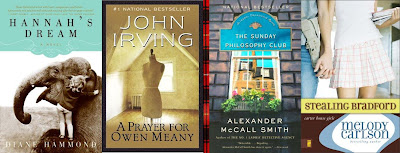 This week in Friday Finds, we are dealing with a phenomena of sorts. I did not find one single book to add to my TBR this week by browsing other book blogs. (Don't worry, I went to a killer Holiday sale at 1/2-Price Books, ransacked the publisher's remainder table at B&N, and found two other books through other means to add nine books to my library.)
This week in Friday Finds, we are dealing with a phenomena of sorts. I did not find one single book to add to my TBR this week by browsing other book blogs. (Don't worry, I went to a killer Holiday sale at 1/2-Price Books, ransacked the publisher's remainder table at B&N, and found two other books through other means to add nine books to my library.) The 1/2-Price Sale: I couldn't pass up 20% off everything, so I picked up five books (for about $16--the price of one new paperback) from some of my favorite authors in my favorite genre: the always "boring" literary fiction.
The 1/2-Price Sale: I couldn't pass up 20% off everything, so I picked up five books (for about $16--the price of one new paperback) from some of my favorite authors in my favorite genre: the always "boring" literary fiction.Straight Man by Richard Russo - The story of an English professor at a fledgling liberal arts college who gets into all manner of crazy situations in the span of one week. The setting (and my love of Russo's writing style) made this a sure sell for me.
Duplicate Keys by Jane Smiley - This attempt at Smiley to dip her toe into mystery when a young woman is killed in an apartment to which many friends hold duplicate sets of keys intrigued me. Knowing Smiley, this can't be a simple who-done-it, it has to be a why'd-they-do-it and why-would-you'd-do-it-too.
The Accidental Tourist, Saint Maybe, and Ladder of Years by Anne Tyler - I perused the mass market paper backs (which 1/2-Price sells for half the publishers list price) and picked up these... I plan to eventually get to her entire cannon, but these (the story of a travel writer who hates travelling, a man converted by a possible religious charlatan, and a woman who disappears on vacation--maybe of her own volition) called out for first pick.
 B&N Sale Table: I picked up two books that were on the deep discount table (two hardbacks for under $13 total) at Barnes & Noble. [Never mind that I saw some hardbacks for cheaper than what I'd recently paid for the paperback versions... I'll be checking the remainder table from now on before splurging on any paperbacks. Lesson learned.]
B&N Sale Table: I picked up two books that were on the deep discount table (two hardbacks for under $13 total) at Barnes & Noble. [Never mind that I saw some hardbacks for cheaper than what I'd recently paid for the paperback versions... I'll be checking the remainder table from now on before splurging on any paperbacks. Lesson learned.]Digging to America by Anne Tyler - I'd never even heard of this book, but Tyler never disappoints me, so I picked this up on Sunday night (and finished it Monday and reviewed it on Wednesday).
The Yiddish Policemen's Union by Michael Chabon - I've said here that I plan to eventually read Chabon's entire cannon, so this tale of crime, love, and community that won a ridiculous number of genre fiction awards was Chabon's attempt to elevate genre fiction without compromising any of the literary merit of his writing. Can't wait.
 Other: I serendipitously ran across this book, The President's Daughter, which is an updated (in 2008) re-release of a book that was originally published in 1984. It's the first in a series about the sixteen-year-old daughter of a female US Senator who makes a successful Presidential run; the series originally was three books long, but the revised and updated version includes a fourth book. I've put this first one on hold at the library and we'll see how they come along and if the rest are worth reading.
Other: I serendipitously ran across this book, The President's Daughter, which is an updated (in 2008) re-release of a book that was originally published in 1984. It's the first in a series about the sixteen-year-old daughter of a female US Senator who makes a successful Presidential run; the series originally was three books long, but the revised and updated version includes a fourth book. I've put this first one on hold at the library and we'll see how they come along and if the rest are worth reading. A co-worker was reading the second book in Stephen Lawhead's King Raven Series, which I'd heard of, and when I asked her if she was enjoying it and mentioned that I'd considered reading them eventually, she offered to loan me the first one, Hood. She brought that to me at work on Wednesday, so I've got that one pressing down on me (in addition to the five books I've got out from the library with impending deadlines).
A co-worker was reading the second book in Stephen Lawhead's King Raven Series, which I'd heard of, and when I asked her if she was enjoying it and mentioned that I'd considered reading them eventually, she offered to loan me the first one, Hood. She brought that to me at work on Wednesday, so I've got that one pressing down on me (in addition to the five books I've got out from the library with impending deadlines).So. Many. Books.































 "'Good,' he said, 'you're back. I was beginning to think you'd fallen into a canal.'
"'Good,' he said, 'you're back. I was beginning to think you'd fallen into a canal.'


